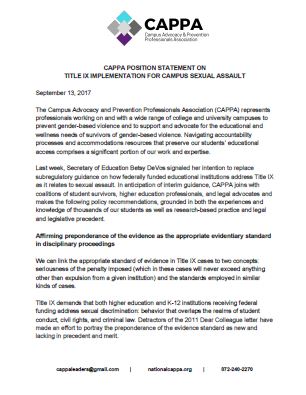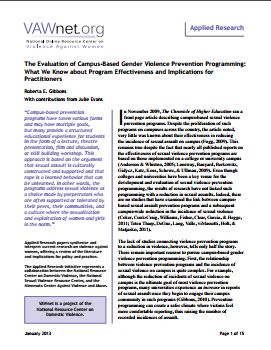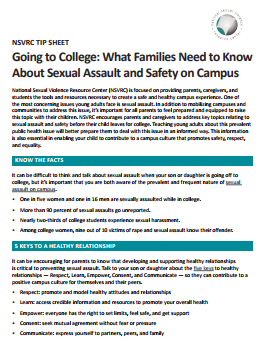Resources Library: Campuses
Start a Search:
CAPPA Position Statement On Title IX Implementation For Campus Sexual Assault

The Campus Advocacy and Prevention Professionals Association (CAPPA) represents professionals working on and with a wide range of college and university campuses to prevent gender-based violence and to support and advocate for the educational and wellness needs of survivors of gender-based violence.
Charting the Path Forward from Campus Prevention Network
In the six years since the release of the Dear Colleague Letter, and the four years since the passage of the VAWA amendments to the Clery Act, colleges and universities across the country have devoted unprecedented attention, time, and resources to preventing sexual assault on campus. EverFi’s Campus Prevention Network, in collaboration with It’s On Us, has examined the current state of sexual assault prevention to identify positive national trends in higher education and spotlight areas that schools need to continue to focus their attention. Among the findings, this report highlights:
- Nearly 50% of college presidents have spoken publicly about sexual assault three or more times in the past year; only a quarter of college presidents did not speak about sexual assault publicly in the past year;
- While fewer than a third of campuses (27.9%) reported stable, consistent funding for evaluation efforts of their prevention programming, nearly all campuses are engaging in at least one evaluation effort of their prevention programming despite funding challenges;
- Peer educators are playing an increasingly prominent role in delivering sexual assault prevention programming on campus; schools and colleges need to ensure peer educators receive appropriate supervision and training to fulfill their responsibilities successfully;
- Significant differences in funding and staffing levels for prevention exist across institutions, particularly in relation to school size; increased investment in prevention is necessary for ongoing impact and progress.
Comprehensive Model Policy on Transgender Students for Four-Year Colleges and Universities
This policy addresses the best practices for four-year colleges and universities regarding enrollment, policy implementation, admissions, programs, facilities, safety, and so much more. To create this policy, Trans Student Educational Resources consulted with dozens of students, community members, and faculty over the course of a year. The policy language in this document has been written so it can easily be copied and enacted by the appropriate governing council of each institution.
For more, visit the Trans Student Educational Resources website here.
Evaluation of Campus Based Gender Violence Prevention Programming from VAWnet

Colleges and universities have been a key venue for the development and evaluation of sexual violence prevention programming. However, there are no studies demonstrating a link between campus-based sexual assault prevention programs and a subsequent campus-wide reduction in the incidence of sexual violence (Coker, Cook-Craig, Williams, Fisher, Clear, Garcia, & Hegge, 2011; Teten Tharp, DeGue, Lang, Valle, Massetti, Holt, & Matjasko, 2011).
Nevertheless, there remain important reasons to pursue campus-based gender violence prevention programming:
- Prevention programming can create a safer climate where victims feel more comfortable reporting, actually raising the number of recorded incidences of assault.
- Using a decrease in the incidence of sexual assault as the only measure of success for prevention programs ignores many other short- and intermediate-term goals that are conceptually linked to a reduction in sexual assault, such as increasing students knowledge about rape and changing attitudes related to rape so that students are less likely to blame victims (Anderson & Whiston, 2005; Lonsway, Banyard, Berkowitz, Gidycz, Katz, Koss, Schewe, & Ullman, 2009).
- Research shows that a significant number of woman experience sexual violence while in college (Fisher, Cullen, & Turner, 2000; Koss, Gidycz, & Wisniewski, 1987; Krebs, Lindquist, Warner, Fisher, & Martin, 2007; Black et. al., 2011).
Info Sheet from NSVRC

Sexual assault is a widespread problem on college campuses. This tip sheet provides information for families to discuss regarding campus sexual assault as well as safety, consent, and healthy relationships. A list of questions to ask about how your child’s college handles sexual assault is also included.

